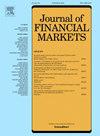零售交易和分析师报道
IF 2.1
2区 经济学
Q2 BUSINESS, FINANCE
引用次数: 1
摘要
零售交易如何影响金融市场的信息供应?我们建立了一个具有内生性信息供给的交易模型,在此模型中,分析师使机构投资者的交易量最大化。在均衡状态下,卖方分析师会在散户大量关注的股票中提供更高质量的信号,因为机构投资者可以在不披露信息的情况下更积极地交易。我们提供了支持模型主要预测的经验证据:零售交易的一个标准差增加导致额外的0.6名分析师覆盖该股票。为了建立因果关系,我们使用股票分割作为零售交易的似是而非的外生冲击来确认我们的结果。本文章由计算机程序翻译,如有差异,请以英文原文为准。
Retail trading and analyst coverage
How does retail trading impact information supply in financial markets? We build a trading model with endogenous information supply where analysts maximize trading volume by institutional investors. In equilibrium, sell-side analysts provide higher quality signals in stocks with large retail interest, as institutional investors can trade more aggressively without revealing information. We provide empirical evidence supporting the main prediction of the model: A one standard deviation increase in retail trading leads to an additional 0.6 analysts covering the stock. To establish causality, we confirm our results using stock splits as a plausibly exogenous shock to retail trading.
求助全文
通过发布文献求助,成功后即可免费获取论文全文。
去求助
来源期刊

Journal of Financial Markets
BUSINESS, FINANCE-
CiteScore
3.40
自引率
3.60%
发文量
64
期刊介绍:
The Journal of Financial Markets publishes high quality original research on applied and theoretical issues related to securities trading and pricing. Area of coverage includes the analysis and design of trading mechanisms, optimal order placement strategies, the role of information in securities markets, financial intermediation as it relates to securities investments - for example, the structure of brokerage and mutual fund industries, and analyses of short and long run horizon price behaviour. The journal strives to maintain a balance between theoretical and empirical work, and aims to provide prompt and constructive reviews to paper submitters.
 求助内容:
求助内容: 应助结果提醒方式:
应助结果提醒方式:


